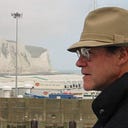The Old Man and the Shore
73 years ago when I was born in Mississippi, Ernest Hemingway was writing a story about an old man and the sea.
As I sit here, seaside, on a beach of the Caribbean island St. John, reading that story, I am also writing a story which may be called Old Man and the Shore. Since I am not out on the open sea hauling in a great fish, as Hemingway was when he was actually the old man experiencing the sea, I am just a guy reading his great fish-tale book on a beach.
Before sitting to read, I did summon up the energy to walk the length of this beach, from one great rocky outcropping to the other.
But my activity here is admittedly lazy compared to Ernest’s life-long escapades driving an ambulance in Italy in World War 1, fighting royalists in Spain during the Spanish Civil War in 1937 and ultimately contending with the great marlin off the coast of Cuba.
As I am reading through Old Man and the Sea, the old fisherman’s rambling thoughts serve as prelude, including his explanation of how to detect an approaching hurricane, using signs from the sky and the sea. But then the real adventure begins when he hooks the big fish and becomes entangled in a three-day, life-threatening contest with that great Grendl-like sea-beast.
Totally challenged in his grueling battle to haul in the great fish, we read the old man’s statement that a marlin, such as the one he has been attempting to conquer for over 24 hours, is less intelligent that the man, but (get this) more noble!
Reading the old man’s thoughts, it is not hard to agree with him that the great marlin — glimpsed only momentarily in glorious cruising leaps, fighting for his life for three days, is, in fact more noble than the cruel, escapading human. In that grand, ancient struggle — man against nature — Hemingway’s fisherman is merely an old man with a cramped hand, a bleeding back and a constant wearing-down of his exhausted, elderly endurance, no thanks to the sparsely-seen, almost ghostly, sea-beast.
As for me, I’m just a vacationing reader sitting on shore, and I just found this book on a shelf in an Air BnB. But hey, there’s a long, hand-written, penciled comment in the blank pages behind the front cover, signed by. . . who’d have thunk it. . . Hemingway himself.
Meanwhile, back on the beach, reading about Hemingway’s famous old fisherman, I feel that the old man finds himself, perhaps slightly guilt-ridden, or actually grieving for the life of the fish, pining for some communion with the great, grand creature that he has, by hook and/or by crooked left hand, ensnared.
“I wish I could show him what sort of man I am. But then he would see the cramped hand. Let him think I am more man than I am, and I will be so.” And after a while, “I wish I were the fish. . . with everything he has, against only my will and my intelligence.”
Such is the macho mind of Ernest Hemingway, legendary man of the extraordinary, early 20th-century, after we Americans and our Allies had emerged victorious, having driven the krauts back into minding their own business in Germany . . . and if that wasn’t enough, we were summoned back out of the 1918 Armistice-enforced peace when hitler conjured up the self-destructive third reich and dragged the whole damned world into another world war.
Ernest Hemingway was a man for that season — that twice-world-war-time. He was an archetype of the bold, but unsung, hero of those world-shattering days, performing great deeds in perilous times.
Now he’s trying to catch a big fish. That’s just what old men do.
But back to Hemingway’s boat story: After a while, the tough old man, weary to the bone, lacerated and slipping toward self-defeat, retreats into his lapsed Catholicism — or perhaps his actual, sometimes faith in God — when he prays the Hail Mary prayer because its shorter and easier to remember than the Our Father, and he promises the Lord that he will perform, later, when the great fish-fight is won, further religious duties . . . conditionally. . . “if I catch (the fish) him”.
Such is the desperate, death-threatened, fall to grace of a collapsed, utterly exhausted Catholic, such as Ernest was. . . and I was, before I turned born again (i.e. “evangelical”) when I was 27.
That was long ago. Now I’m an old man on the shore, reading the novel that Hemingway and Random House published the year after I was born, a long time. . . years, ago. It is a fish story like no other.
And it is more profound than trying to capture the magamaniacs.
